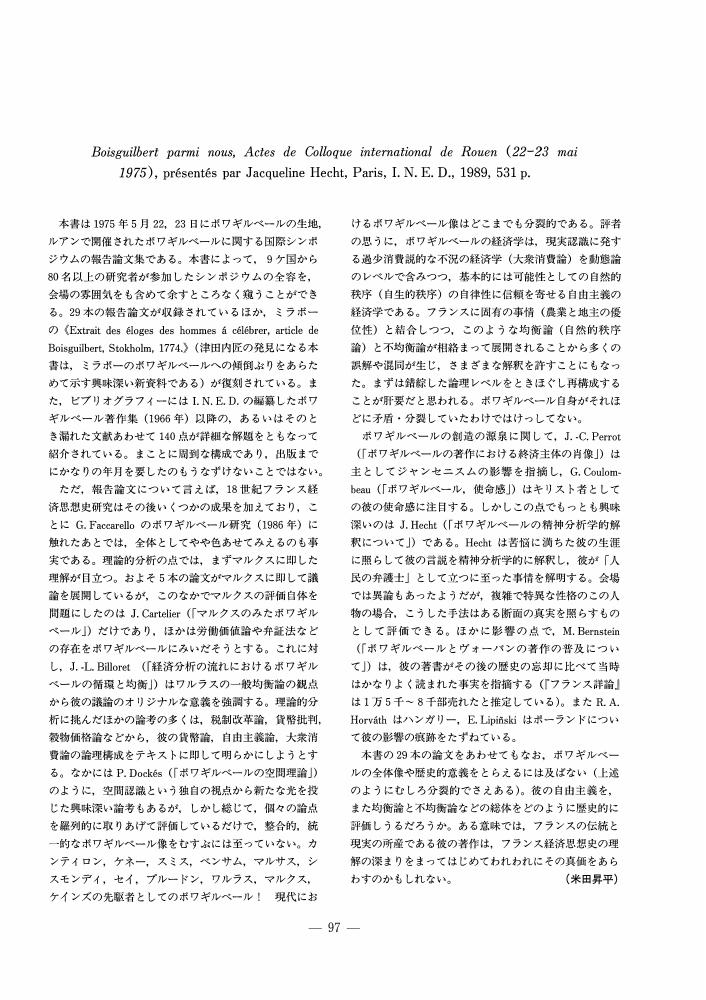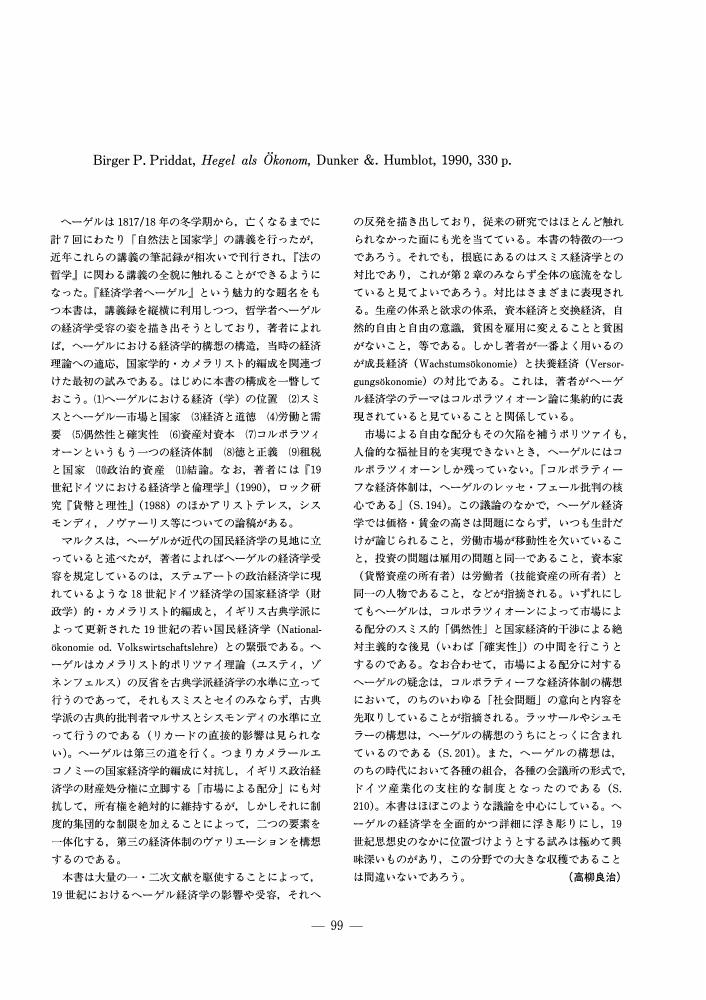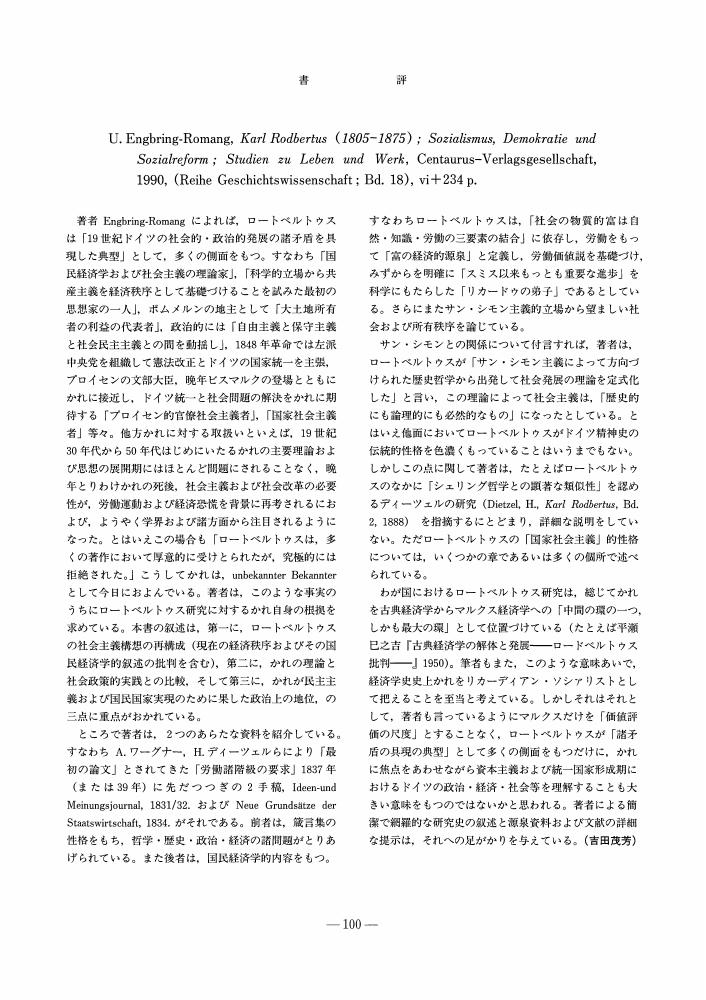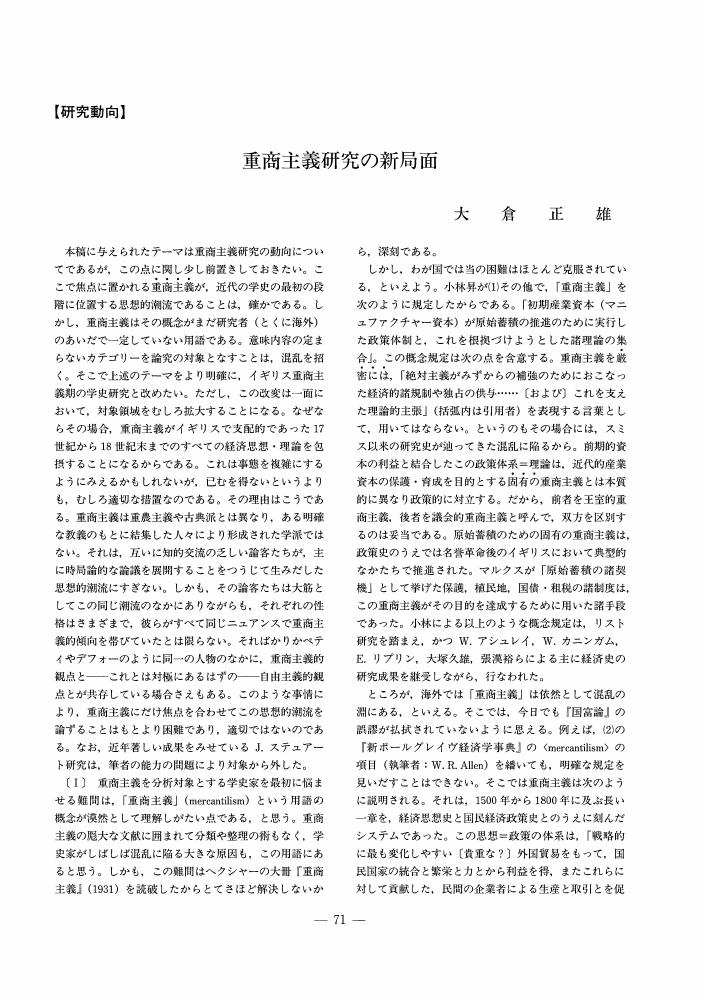- 著者
- 米田 昇平
- 出版者
- The Japanese Society for the History of Economic Thought
- 雑誌
- 経済学史学会年報 (ISSN:04534786)
- 巻号頁・発行日
- vol.30, no.30, pp.97, 1992 (Released:2010-08-05)
- 著者
- 山崎 耕一
- 出版者
- The Japanese Society for the History of Economic Thought
- 雑誌
- 経済学史学会年報 (ISSN:04534786)
- 巻号頁・発行日
- vol.30, no.30, pp.98, 1992 (Released:2010-08-05)
- 著者
- 高柳 良治
- 出版者
- The Japanese Society for the History of Economic Thought
- 雑誌
- 経済学史学会年報 (ISSN:04534786)
- 巻号頁・発行日
- vol.30, no.30, pp.99, 1992 (Released:2010-08-05)
- 著者
- 吉田 茂芳
- 出版者
- The Japanese Society for the History of Economic Thought
- 雑誌
- 経済学史学会年報 (ISSN:04534786)
- 巻号頁・発行日
- vol.30, no.30, pp.100, 1992 (Released:2010-08-05)
- 著者
- 立川 潔
- 出版者
- The Japanese Society for the History of Economic Thought
- 雑誌
- 経済学史学会年報 (ISSN:04534786)
- 巻号頁・発行日
- vol.30, no.30, pp.101, 1992 (Released:2010-08-05)
1 0 0 0 OA 戦後マルサスの穀物法改正論
- 著者
- 羽鳥 卓也
- 出版者
- The Japanese Society for the History of Economic Thought
- 雑誌
- 経済学史学会年報 (ISSN:04534786)
- 巻号頁・発行日
- vol.30, no.30, pp.1-9, 1992 (Released:2010-08-05)
Ricardo proposed concerning the revision of the corn laws in 1822 that a fixed duty of ten shillings per quarter should be imposed on importation of wheat finally. But his proposal means a countervailing duty for the peculiar taxes which are imposed on the corn growers, over those which are imposed on the other classes of producers in the country.Now, Malthus asserted in 1826 that a duty on importation not too high, and a bounty on exportation nearly such as was recommended by Ricardo, would probably be best suited to the present situation. Though his opinion resembled Ricardo's proposal in appearance, yet the duty proposed by Malthus did not mean a countervailing duty.Malthus supported the protection to agriculture by adopting the policy of restricting the importation of corn. Since 1814, however, he has had misgivings about very high duties, operating alone, are peculiarly liable to occasion great fluctuations of prices. And then, he proposed a duty not too high as well as a moderate bounty, with a view to prevent the great fall of prices that might be occasioned by a glut.
1 0 0 0 OA 商業社会把握の政治的インプリケーション
- 著者
- 深貝 保則
- 出版者
- The Japanese Society for the History of Economic Thought
- 雑誌
- 経済学史学会年報 (ISSN:04534786)
- 巻号頁・発行日
- vol.30, no.30, pp.10-18, 1992 (Released:2010-08-05)
- 参考文献数
- 28
This article on British economic thought during the period from the late 1790's to early 1830's has two aims. The first is to investigate Malthus' economic thought in the context of the theology and his Whig inclinations. The second is to reveal the diversities in the understanding of ‘commercial society’ among his contemporaries.To begin with the latter point, the Edinburgh Review played an important role as the conveyer of the idea of the art of government and the analysis of ‘commercial society’ from the eighteenth-century Scottish tradition to the nineteenth-century British economic arguments. In this context, when Ricardo's Principles was published, McCulloch considered it not as the subsitution but as the compensation for Smith's Wealth of Nations. But in the decade of 1820's there were several points severely debated; for example, whether to accept the idea of the ‘conjectural history’, how to evaluate the result of the industrialization, and what kind of the position to be selected on the problem on Parliamentary Reform.In comparison with these arguments, Malthus' position is able to be characterized as that of medium. In some cases, Malthus judged on the political or economic problem not from the maximum of wealth but from that of happiness or safety. So, for Malthus, the concept of ‘proportions’ has the especial importance to the economic reasoning.
1 0 0 0 OA リカードウの知的世界と経済学
- 著者
- 飯田 裕康
- 出版者
- The Japanese Society for the History of Economic Thought
- 雑誌
- 経済学史学会年報 (ISSN:04534786)
- 巻号頁・発行日
- vol.30, no.30, pp.19-27, 1992 (Released:2010-08-05)
In this paper I consider some problems about non economic interests of David Ricardo that appear in his unpublished letter to Lady Mary Shepherd. Lady Mary is a minor figure in the history of economics. She was not an economist but a member of so called “bluestocking.” David Ricardo acquainted with her already in 1812, when they had an opportunity to discuss some academic or scientific topics, particularly astronomical problems.Ricardo wrote a letter to her on 6th Oct. 1819. The letter informed us now that he received an extract from a book by P. S. Laplace, French astronomer, from Lady Mary. He criticized Laplace's calculation of the precession of equinox from view point that it is necessary to distinguish the general outlook of universe from the observation.
1 0 0 0 OA カール・メンガーのジャーナリズム経験
- 著者
- 入木 紀一郎
- 出版者
- The Japanese Society for the History of Economic Thought
- 雑誌
- 経済学史学会年報 (ISSN:04534786)
- 巻号頁・発行日
- vol.30, no.30, pp.28-36, 1992 (Released:2010-08-05)
As a young man Carl Menger worked as a journalist over a ten year period. Basing itself on the memorandum in his diary, this paper first gives an overview of his journalistic activity and tries to locate it in the Viennese politics of his day. Menger's later recollection that he discovered marginal utility theory through his experience of writing market reports for a Viennese paper is examined. Menger's theory originally emerged as the individualistic counterpart of price determination in the market. Menger's liberalism, as well as his rich experience in journalism, attracted the interest of his pupil, Crown Prince Rudolf. Rudolf's tragic death was a fatal blow to his teacher who had still hoped something could be accomplished by liberal initiatives from above.
1 0 0 0 OA エルヴェシウス; 功利主義における名誉心
- 著者
- 森村 敏己
- 出版者
- The Japanese Society for the History of Economic Thought
- 雑誌
- 経済学史学会年報 (ISSN:04534786)
- 巻号頁・発行日
- vol.30, no.30, pp.37-45, 1992 (Released:2010-08-05)
This essay discusses the thoughts of Helvétius, by focusing on the reaction to his first book De l'esprit, which evoked an furious outcry, not only from the religious authorities but from the philosophes.It is his egoistic hedonism that has become the target of criticism. Helvétius asserted that the man is necessarily governed by the pleasure and pain derived from the senses. The Church attacked this theory as destructive to the Christianity and the philosophes opposed the sympathy or the natural goodness in human nature to Helvétius's selfish principles. These critics, however, underestimated the role of “Honour” in his moral philosophy. Helvétius argued that the man, selfish as he is, should contribute to the public interest, provided that his virtuous action would be dully rewarded with the esteem of the public. Thus Honour comes to be the key to his moral science. But in France under the Ancien Régime, this moral sanction did not work efficiently, because the political power was exclusively occupied by the aristocracy whose interest was opposed against the public interest. Helvétius, therefore, demands a radical reform that will make it possible to controll the government by the public interest.
1 0 0 0 OA 初期のJ. S. ミルと貨幣数量説
- 著者
- 竹内 洋
- 出版者
- The Japanese Society for the History of Economic Thought
- 雑誌
- 経済学史学会年報 (ISSN:04534786)
- 巻号頁・発行日
- vol.30, no.30, pp.46-54, 1992 (Released:2010-08-05)
J. S. Mill says “That an increase of the quantity of money raises prices, and a diminution lowers them, is the most elementary proposition in the theory of currency…” in his Principles of Political Economy (1848). However he should not be understood as a supporter of such “Simple Quantity Theory of Money.” He was rather an opponent of that theory. Because Mill was first a diciple and later a colleague of Thomas Tooke (1774-1858)—who is regarded as the strongest opponent of the “Simple Quantity Theory of Money.” Tooke's influence to Mill is shown clearly in his early papers, “Paper Currency and Commercial Distress” (1826) and “The Currency Question” (1844). In these papers, he demonstrates how the concept of “hoard” and the “law of reflux” invalidate the “Simple Quantity Theory.” Moreover he mentioned the two aspects of the circulation, the circulation of income and that of capital. These facts show that Mill held the same theoretical views as Tooke. And when his Principles is reread more carefully, it will be found that he did not revised this early position. My next subject is to make clear how he built those theoretical points into Principles and placed the role of money in it.
1 0 0 0 OA ケインズ『一般理論』における資産の集計構造と金融政策の有効性
- 著者
- 加納 正雄
- 出版者
- The Japanese Society for the History of Economic Thought
- 雑誌
- 経済学史学会年報 (ISSN:04534786)
- 巻号頁・発行日
- vol.30, no.30, pp.63-70, 1992 (Released:2010-08-05)
- 参考文献数
- 11
The purpose of our paper is to investigate the aggregative structure of assets in Keynes' General Theory and to investigate the relation between this structure and Keynes' view about the effectiveness of monetary policy. According to Leijonhufvud, Keynes aggregated the long-term assets including financial assets and physical assets as non-money assets. Then relative price of bonds and capital goods is constant, and the interest elasticity of investment is high. We examine Leijonhufvud's this view, and investigate how Keynes considered the differences in non-money assets.In General Theory, as a basic model, the relative prices of non-money assets are not treated as endogenous variables, then in this sense, non-money assets are aggregated, but this is rather convenient treatment for simplicity, and this does not mean the differences in non-money assets are not important. We consider that changes in estimate of risk and liquidity of non-money assets are important factors in Keynes' view about the effectiveness of monetary policy, even if these are not theoretically analyzed.
1 0 0 0 OA 重商主義研究の新局面
- 著者
- 大倉 正雄
- 出版者
- The Japanese Society for the History of Economic Thought
- 雑誌
- 経済学史学会年報 (ISSN:04534786)
- 巻号頁・発行日
- vol.30, no.30, pp.71-75, 1992 (Released:2010-08-05)
- 参考文献数
- 11
- 著者
- 渡辺 邦博
- 出版者
- 経済学史学会
- 雑誌
- 経済学史学会年報 (ISSN:04534786)
- 巻号頁・発行日
- vol.29, no.29, pp.44, 1991 (Released:2010-08-05)
- 著者
- 石井 信之
- 出版者
- 経済学史学会
- 雑誌
- 経済学史学会年報 (ISSN:04534786)
- 巻号頁・発行日
- vol.29, no.29, pp.45, 1991 (Released:2010-08-05)
1 0 0 0 OA 橋本昭一編著『マーシャル経済学』, ミネルヴァ書房, 1990, x+305 p.
- 著者
- 田中 眞晴
- 出版者
- 経済学史学会
- 雑誌
- 経済学史学会年報 (ISSN:04534786)
- 巻号頁・発行日
- vol.29, no.29, pp.46, 1991 (Released:2010-08-05)
1 0 0 0 OA 植村邦彦『シュルツとマルクス』, 新評論, 1990, 302 p.
- 著者
- 石塚 正英
- 出版者
- 経済学史学会
- 雑誌
- 経済学史学会年報 (ISSN:04534786)
- 巻号頁・発行日
- vol.29, no.29, pp.47, 1991 (Released:2010-08-05)
- 著者
- 菊池 壮蔵
- 出版者
- 経済学史学会
- 雑誌
- 経済学史学会年報 (ISSN:04534786)
- 巻号頁・発行日
- vol.29, no.29, pp.48, 1991 (Released:2010-08-05)
1 0 0 0 OA 杉原四郎『西欧経済思想史研究』同文館, 1990, xii+286p.
- 著者
- 山崎 怜
- 出版者
- 経済学史学会
- 雑誌
- 経済学史学会年報 (ISSN:04534786)
- 巻号頁・発行日
- vol.29, no.29, pp.49, 1991 (Released:2010-08-05)
- 著者
- 松本 有一
- 出版者
- 経済学史学会
- 雑誌
- 経済学史学会年報 (ISSN:04534786)
- 巻号頁・発行日
- vol.29, no.29, pp.50, 1991 (Released:2010-08-05)












